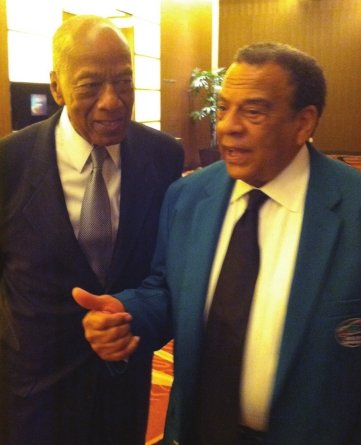
“I know exactly where I was,” Green said. “I was at 221 Durand St. (in East Lansing), shaving and getting ready to go out to dinner, when Mrs. King called me.”
The conversation was short and to the point. King’s wife, Coretta Scott King, told him, “Dr. King has been shot.” He asked her how serious it was, but she didn’t know yet. About 20 minutes later, he learned King had died.
“I was dumbfounded,” he said. “Then, I was still.”
Stories like this are at the core of Green’s new memoir, “At the Crossroads of Fear and Freedom: The Fight for Social and Educational Justice,” recently released by the Michigan State University Press.
Green, 82, earned a doctorate from MSU in in 1965 and later served as dean of the College of Urban Development. He returns to the Lansing area next week for a string of Martin Luther King Jr. Day events. His friend Andrew Young addresses Lansing’s 31st annual Martin Luther King Jr. Day holiday luncheon at the Lansing Center on Monday. Later, the two activists will travel to Jackson where they will address 1,000 prisoners.
Tuesday evening, Green will join the Historical Society of Greater Lansing for a book signing and discussion at the Capital Area District Library’s downtown branch.
East Lansing is where Green began his career in the civil rights and anti-war movements. He learned early on about racial injustice when he was unable to buy a house in the city due to racial exclusionary clauses.
Green became very active in East Lansing’s open housing debate in 1965, and even served on the city’s Open Housing Commission. But that did not keep him from joining demonstrators when talks stalled. His good friend John Duley, a former chaplain and minister at MSU, plays an important role in the book. Green and Duley, along with Duley’s spouse, Betty, and local minister Truman Morrison, fought against East Lansing’s well-established housing discrimination practices.
Green writes of local Realtor Walter Neller confronting him in his home and of then-MSU President John Hannah offering to buy him a house to sidestep the problem. Green declined the offer.
Despite significant advances in civil rights, Green still sees de facto housing discrimination as minorities are pushed to poor neighborhoods.
“The fight is not over,” he said. “We need more John Duleys. In fact, we need more Bob Greens.”
Later that same year, a momentous occasion would take Green’s life in an unexpected direction.
As one of the leaders of social activism on campus, Green was selected to accompany King, who had been invited to campus to help raise funds for MSU’s Student Educational Project. The program sent students and faculty to Rust College in Mississippi to provide tutoring services.
Green had first met King while a student at San Francisco State University. They had kept in touch, so Green was quite familiar with the dynamic leader. But he did not expect King to say to him, “Brother Green, you ought to join us in the struggle.”
On the trip back to the airport, King repeated his request, “You ought to consider working with us in the South.” Green agreed, and he soon found himself in the heart of the tumultuous civil rights movement.
Green served as education director of the Southern Christian Leadership Conference, and he would ultimately go on to become a consultant on major school desegregation cases across the country.
“King believed that education was central to the civil rights movement,” Green said.
In one of the most interesting passages in the book, Green describes taking over leadership of the traumatic March Against Fear after the march’s leader, James Meredith, was shot on the first day. Later, Green writes about being a pall bearer at King’s funeral. After all of these experiences, Green still traces the roots of his activism to MSU.
“I look back and I was always for pressing for social change,” Green said. “I always felt that MSU was a place you could fight and people there would help.”
Robert L. Green
Discussion and book signing 7 p.m. Tuesday, Jan. 19 FREE Capitol Area District Library Downtown Branch 401 S. Capitol Ave., Lansing (517) 282-0671, lansinghistory.org
Support City Pulse - Donate Today!
Comments
No comments on this item Please log in to comment by clicking here